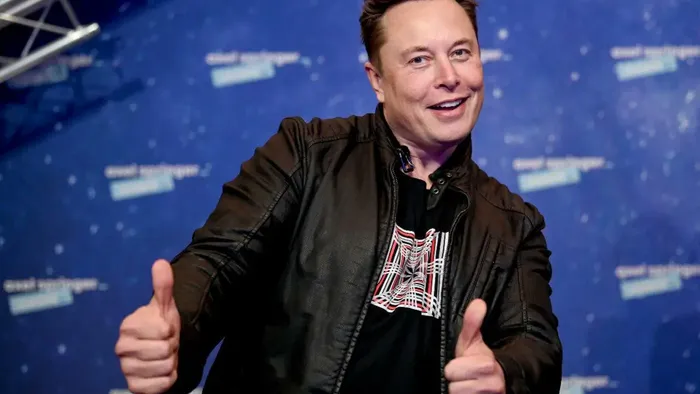EFF and MK Party slams policy easing for Starlink as ‘backdoor for foreign monopolies'

Opposition parties have rejected the B-BBEE policy exemption for Elon Musk’s Starlink, calling it a "backdoor for foreign monopolies."
Image: X
A gazetted policy proposal to ease Broad-Based Black Economic Empowerment (B-BBEE) requirements for the licensing of satellite communication services, such as Elon Musk’s Starlink, was a "backdoor for foreign monopolies", political parties said.
The Economic Freedom Fighters (EFF) and uMkhonto weSizwe Party (MK Party) rejected the proposed ease of B-BBEE requirements.
The EFF said it provided a “backdoor for foreign multinationals” like Starlink to bypass South Africa's B-BBEE laws through the so-called "Equity Equivalent Investment Programmes" (EElPs).
“The EFF expected this betrayal, and we have consistently warned that the Government of National Unity (GNU) is facilitating the erosion of transformation in the interests of white capital and Western imperialism,” the party said in a statement.
The party further claimed the policy was unconstitutional and driven by external pressure, particularly from South African-born millionaire Musk, whom they described as a close ally of United States President Donald Trump.
The controversy comes amid ongoing tension between EFF leader Julius Malema and Trump over the latter’s repeated criticism of South Africa, including claims related to the controversial “Kill the Boer” chant.
Meanwhile, former president Jacob Zuma-led MK Party also denounced the policy.
The party’s national spokesperson Nhlamulo Ndhlela called the policy a “treacherous blueprint” aimed at dismantling state capacity and enabling backdoor deals with foreign tech oligarchs.
“This gazette is not mere bureaucracy,” the party’s national spokesperson Nhlamulo Ndhlela said.
“It is the execution phase of a covert pact brokered by Ramaphosa, [Democratic Alliance leader John] Steenhuisen and their neoliberal mentor Donald Trump, to subvert the Information and Communication Technology (ICT) Charter and neutralise Broad-Based Black Economic Empowerment (B-BBEE) imperatives in favour of unaccountable global capital.”
Musk has previously criticised South Africa’s affirmative action laws, arguing they hinder business development.
He has claimed Starlink was denied a license to operate in South Africa because “he was not Black”.
However, the EFF said the African National Congress (ANC) and government have "kneeled" to pressure after Musk refused to comply with the country's laws.
“This policy is tailor-made to allow Starlink access to operate in South Africa without meeting the mandatory 30% local ownership requirement as per the Electronic Communications Act. Musk has arrogantly refused to comply with our sovereign laws, and the ANC-led government has chosen to kneel,” the EFF said.
“This policy is clearly a capitulation in the face of an aggressive disinformation campaign of white genocide perpetuated by Musk. Musk, through Starlink, is now essentially being rewarded after a pure case of corporate terror that undermines our sovereignty and necessary transformation policies.”
On Friday, IOL News reported that less than two days after a tense White House meeting allegedly facilitated by South African billionaire Johann Rupert, Starlink appears to be facing new regulatory easing in South Africa.
The meeting, which was attended by President Cyril Ramaphosa and Trump, involved Rupert urging officials to fast-track Starlink’s launch, citing economic stagnation and rising crime.
“We need Starlink in South Africa,” Rupert said, emphasising the importance of technological advancement for the country's future.
Minister of Communications and Digital Technologies, Solly Malatsi gazetted the policy direction on the role of investment programmes (EElPs) in the ICT sector, saying they are tools to accelerate broadband access.
Ndhlela rejected Malatsi's claim of "stakeholder consultation,” calling it a “smoke-and-mirrors tactic.”
“The MK Party demands immediate and full public disclosure of these so-called stakeholders. Who was consulted? Were black-owned SMMEs, community networks and transformation champions even in the room, or was this a closed-door session for foreign monopolies and their local proxies? he added.
Meanwhile, the ANCYL also issued a strong rebuke, saying that the proposal represents a clear step backwards in dismantling apartheid-era economic structures.
“It undermines the constitutional imperative for redress and inclusive economic transformation. The very purpose of B-BBEE is to ensure that the historically excluded Black majority are not relegated to being ordinary consumers of foreign technology, but are instead positioned as key producers, owners, and innovators in the economy,” said ANCYL secretary general Mntuwoxolo Ngudle
”To weaken empowerment regulations in the lucrative ICT sector is to entrench digital colonialism,” he added.
“It invites monopolistic foreign entities to operate in our market without the obligation to empower local Black owned enterprises or invest in skills development, SMME partnerships, and rural connectivity infrastructure led by South Africans.”
Ngudle condemned Musk and his company.
“The Youth League is not afraid to call out imperialism wrapped in innovation. No white owned foreign tech giant will be allowed to bypass South Africa's transformative laws with the help of local sellouts and anti-Black lobby groups like AfriForum,”
IOL Politics